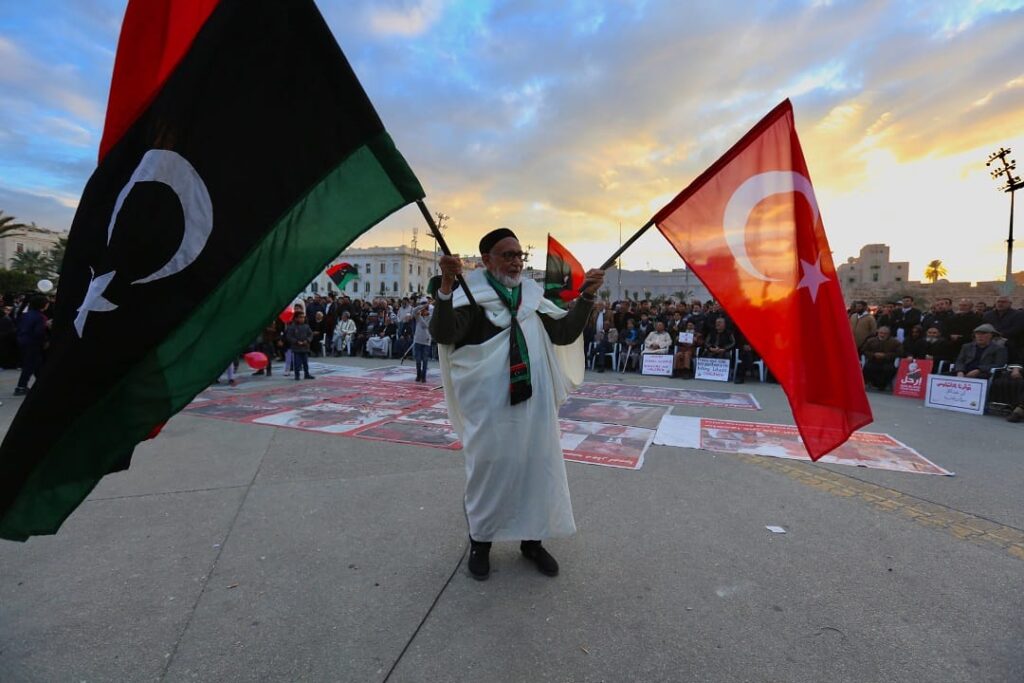
TRIPOLI, LIBYA – JANUARY 10: An elderly man holds Turkish and Libyan flags during a demonstration in support of the UN-recognized Government of National Accord (GNA) against Turkey’s eastern-based eastern army commander Khalifa Haftar in Tripoli’s Martyrs’ Square on January 10, 2020. Hazem Turkiah/Anadolu Agency
Image source: Crisis Group
On October 29, Turkey celebrated 100 years since its founding as a secular, Western-facing nation. However, since Atatürk founded the modern Turkish state, Turkey has transformed from a secular state with Western leanings to one that is increasingly religious and uninterested in aligning with Western geopolitics and expectations. Especially since the election of President Tayyip Erdogan in 2014, Turkey has increasingly championed Islamist ideals and pursued a stronger regional geopolitical role. Turkey has sought to achieve these objectives by pursuing two distinct economic strategies. First, Turkey has pursued an energy partnership with North Africa, especially Libya. Second, Turkey has expanded its diplomatic and economic footprint in sub-Saharan Africa through providing direct assistance packages for socio-economic infrastructure, funding counterterrorism efforts, and championing arms and small arms trade. While Turkey’s economic footprint in Africa pales in comparison to that of the United States and China, the country continues to present itself as a friendly alternative to those larger powers, especially to Muslim-majority countries. Turkey’s economic and political shift to Africa may initially alarm the United States and its NATO allies, but it also presents them with political opportunities as Turkey charts its course.
Turkey’s relations with the West before 2014 have fundamentally changed. Today, Turkey is less willing to maintain close economic and political ties with the West, and President Erdogan has shown little interest in preserving Turkey’s secularism and pro-Western identity. Furthermore, political differences between Presidents Erdogan and Biden have increased tensions between Turkey and the United States, with the U.S. Congress continuing to delay the passage of Turkey’s long-awaited $20 billion F-16 fighter jet deal. Meanwhile, the Turkish parliament has continually postponed a decision to admit Sweden as a NATO member, frustrating the West. Finally, Turkey and the United States are at bitter odds over the Israel-Gaza crisis, which only deepens the rift between the Erdogan and Biden administrations. Despite political challenges, Turkey and the West share a historic partnership and have a common interest in curbing Russian and Iranian excesses in the Black Sea region. Turkey has historically been deeply concerned about Russia’s expansion southward and has militarily supported the United States during the Cold War to balance the Soviet Union. Even today, Turkey supports the defense of Ukraine. Turkey and Iran are long-time regional rivals due to their often opposing religious and political ideologies. The United States considers Russia and Iran as revisionist actors and its most important geopolitical adversaries. There is a shared interest between Turkey and the United States in maintaining Turkey’s relative political hegemony in the Black Sea region to curb Russian and Iranian influence.
As the world moves into an era of relative multipolarity and great power competition, Turkey is taking steps to become an influential regional power. In particular, Turkey is seeking a “pivot to the south” by strengthening its North African energy market and deepening strategic economic and diplomatic ties with sub-Saharan African countries. All this while Turkey continues to struggle with its energy dependency. In 2022, Ankara and Tripoli signed a memorandum of understanding for hydrocarbon exploration in the Eastern Mediterranean, and Turkey moved to increase its presence in Libya’s construction sector. Since 2003, Turkey has increased its trade with African countries eightfold, supported major construction projects in sub-Saharan Africa, and provided economic and military aid to many countries on the continent. President Erdogan’s visit to Somalia in 2011 was the first visit of a non-African leader to Mogadishu in nearly two decades. More recently, Turkey has focused on a “drone diplomacy” strategy, providing drones and small arms to African countries, especially those in the Sahel region battling jihadist groups like Al-Shabaab. As Turkey grows its influence in Africa, it is emphasizing its freedom from ideological and colonial ties and positioning itself as a less exploitative partner than China, notorious for its debt-ridden diplomacy.
Turkey’s actions demonstrate its strong interest in diversifying and strengthening its economy and building a reputation as a credible regional leader.
Despite political challenges, Turkey’s Western NATO allies remain “central to” Turkey’s aspirations to expand its global power and influence. Similarly, while the United States and many European countries have tensions with Turkey over human rights, governance, and more recently Erdogan’s open support for Hamas, Turkey remains a key NATO ally and counterbalance in the Black Sea region. If the United States and NATO allies want to rebuild an effective political relationship with Turkey, they may need to critically examine Turkey’s expanding regional role and how Western countries strategically approach their economic and political relations with Turkey. Turkey’s energy dependence on Russia remains a concern for NATO allies, and Turkey’s new energy partnership with Tripoli could be one avenue for Turkey to diversify its energy imports. Turkey’s growing economic influence in Africa, while not yet at a level that would allow it to compete with China and Russia for regional influence, makes it a prominent option for countries seeking direct bilateral loans, infrastructure assistance, and small-scale military equipment. As Turkey celebrates its 100th anniversary, it may be time for the United States and NATO to consider the future of Turkey’s broader role. From a regional perspective, it is in the West’s interest to support Turkey as a counterbalancing force against Iran. Within Africa, Turkey represents a more belligerent and exploitative economic alternative to Russia and China. The United States may want to consider supporting Turkey in its economic leadership in Africa. Turkey’s economic and diplomatic goals in Africa may align more closely with Western political priorities than we realize.


